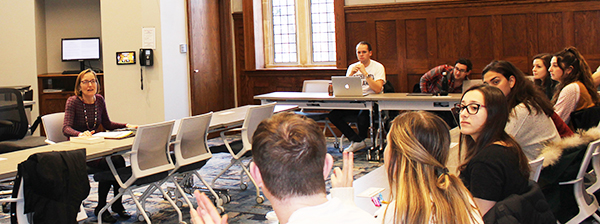
As readers know, we have recently undertaken an extensive renovation in Jepson Hall, transforming an auditorium into our new ethics suite, comprising a state-of-the-art classroom, small conference room, and offices. I was excited to watch the progress of the renovations during the fall semester. On Tuesday, I taught in the space, in part because I wanted to experience the fruits of our planning directly, but also because it’s been some time since I’ve offered a class at Jepson! My class, Competition, Cooperation, and Choice, is an elective cross-listed in leadership studies and economics.
It was a joy to welcome students back to campus after winter break. We spent more than two hours getting to know one another and exploring some preliminary material that will be our main themes throughout the semester.
With the students, I hope to examine two gaps, one in the economics literature and the other in the leadership literature. It is no exaggeration to state that the notion of leadership rarely figures in economic analysis and economic ideas rarely figure in leadership studies. It seems to me, however, that economic interactions often involve leading (and following). More than this, incentives matter. Leadership scholars who ignore incentives and focus mainly on individuals cannot fully explain leadership decisions. Thus, the broad frame of the course.
Micro economists talk about “the individual,” a faceless and nameless agent; the “representative” consumer or firm and competition just happen. But economic decision making and outcomes are essentially the result of individuals coming together in social settings (a marketplace, an organization, a political entity). Similarly, leadership scholars often presume that people should collaborate, while ignoring questions such as the cost of or end reason for collaboration.
Supposing individuals come together to make decisions in a group: What does it mean to say the group has a leader? How does the presence of such a leader affect the outcome? Is the leader in some way beholden to the idea of cooperation?
Adam Smith was one of the first to treat such interactions seriously. A moral theorist, Smith’s Theory of Moral Sentiments (1759) grounded a theory of morals on the human sentiments. In his Wealth of Nations (1776), he stressed that we need to help the self, to be “prudent,” to save for ourselves and our families. These two great books – one focused on how we help others by doing the right thing, the other on how we look after ourselves first – will frame the central question for our study throughout the semester. I look forward to learning alongside our students!
